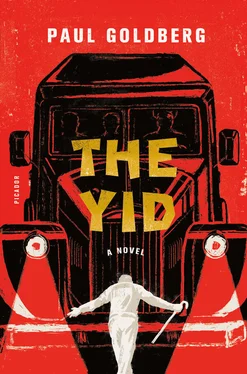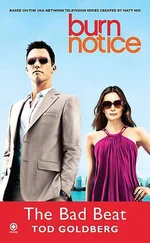The man was wearing a white undershirt and uniform pants with a thick red stripe along the side, indicating that, even in his undershirt, he was an admiral. He was also wearing a black patent leather belt, the sort one would wear to review parades or have an audience in the Kremlin.
Arkashka knew the admiral’s name from front-line gossip. He had been in command during the defense of Leningrad. There, he deployed something called “the floating machine gun nests.” These were, essentially, rafts, each holding a machine gun and a hapless lone soldier or sailor. The rafts were anchored at various points in the Gulf of Finland, around the city. If a gunner saw the Germans, he was expected to open fire, thereby giving away his position, and since there was no way to escape, this led to certain death. These were literally floating coffins.
Arkashka reminded himself that he was no longer a grunt, no longer the guy who dragged maimed soldiers through the minefields. He was a Soviet physician and, virulent nonsense in the newspapers notwithstanding, he was proud of his rank.
The old woman lay on the bed, beneath a large painting of two deer by a stream. It would have been a peaceful scene, had it not been life-sized and framed in gold. The artist was German. Obviously, this was a “trophy” from the war. The admiral had to have commandeered a railroad car to get this monstrosity from Berlin to Moscow.
The armchair looked like another trophy, a throne grand enough for der Führer.
Arkashka nodded to the admiral but introduced himself to the patient, whose name he had seen on the complaint: “Ol’ga Petrovna, I am Dr. Arkady Kaplan. I am here to make you better.”
The patient was taking rapid, shallow breaths. She was disheveled, obviously dehydrated, unresponsive. Her mouth drooped on the left side, a sign of a past stroke. According to the call, the stroke occurred a year ago.
“Looks like she has been experiencing Cheyne-Stokes respiration for at least twenty-four hours, more likely forty-eight,” Arkashka estimated silently. “Almost certainly, she needs to be hospitalized — or, perhaps, it’s time to say good-bye.”
Spartak gently set down the stretcher and left the room. He would be called in later, to help carry the woman to the ambulance.
“Repeat your last name, young man,” ordered the admiral, and the combination of the tone of his voice and the smell of alcohol on his breath told Arkashka that this wasn’t going to go well.
After years as a medical student, Arkashka grew accustomed to being addressed formally, as vy . This man used the familiar, ty. This was a sign of contempt, which could only get worse after this man got to contemplate Arkashka’s last name. (It’s unlikely that non-Jewish Kaplans exist anywhere in the world.)
“Kaplan, Arkady Leonidovich,” Arkashka repeated. He gave his full name.
“Ot vashego brata ne ubezhish,” said the admiral. There is no escape from you.
Arkashka left this unanswered. “May I examine your mother, Comrade Admiral?”
Arkashka’s preferred way of dealing with ethnic slurs and other forms of insult was to ignore them. This is an accepted approach in the medical profession, because a doctor who is regularly insulted may eventually start to believe in his own inferiority.
Kogan called it a mind-fuck, mozgoyebaniye .
Self-confidence is a component of clinical judgment, and a doctor whose clinical judgment is compromised is harm waiting to happen. Kogan had been getting this nonsense throughout his career, and to protect his patients, he had completely desensitized himself to it.
Or so he claimed over vodka one night. Imagine a surgeon infected by belief in his own inferiority.
“Now, Abram , this is my mother, understand?” said the admiral.
“Yes, Comrade Admiral. I understand this. Now I will measure her heart rate and listen to her heart.”
Arkady let the slur pass. He picked up the old woman’s right hand, the one not affected by the stroke. It felt limp.
“Ol’ga Petrovna, can you squeeze my hand?” he asked, knowing that she couldn’t.
While her hand was in his, Arkashka took her pulse. It was around 120 beats per minute, about twice the normal. Respiratory rate was about thirty-six breaths per minute, about six times the normal. Blood pressure was eighty over forty, reptilian low.
“There are many of your brothers in Kremlyovka,” said the admiral as Arkashka grabbed the stethoscope out of his doctor’s bag. “You’d feel at home there.”
Through the stethoscope, Arkashka heard scattered, rattling noises. That was the sound of rhonchi, a fancy way of saying junk in the airways.
“May we discuss the status of the patient, Comrade Admiral?”
“Kaplan, Kaplan. Abrasha.”
The admiral pronounced the r in an exaggerated way intended to mimic Yiddish. It came out on a spectrum between r and h . “And during the war, where were you, Kaplan?”
“I was in Stalingrad, Comrade Admiral.”
Arkashka’s pronunciation was clear, as Moscow as it gets.
“Stalinghad…,” repeated the admiral in mocking accent. “I’ll tell you where you were! In Kazan’, behind the Ural, drinking Russian blood.”
He was drunk, of course, but Arkashka was no stranger to drunks. The only thing to do was to go through the case, make the decisions that needed to be made, and get the fuck out.
“Comrade Admiral, I know this is very difficult…,” Arkashka carried on. “Your mother is breathing the way she is because her body isn’t absorbing oxygen the way healthy bodies do. As carbon dioxide builds up, she compensates by breathing more rapidly. This is called Cheyne-Stokes respiration. I know it’s difficult to accept, but this is how death begins.”
“Molchat’!” shouted the admiral. Silence!
“The situation may not be hopeless, however,” Arkashka soldiered on. “Your best course of action would be to take Ol’ga Petrovna to the Kremlin hospital, where they will be able to do a chest X-ray, do blood work. If appropriate, they may use a respirator, a machine that will help her breathe, at least for a while. Municipal Hospital Number One, where I work, doesn’t have a respirator. My ambulance can transport her to Kremlyovka. You can come with us in the ambulance while your staff makes appropriate arrangements.”
The admiral’s hand grabbed Arkashka by the lapels of his white coat. The hand was strong, beefy. The palm was so large, it seemed to cover half of Arkashka’s chest.
“Now you listen to me, Rabinovich. This is my mother. Mother! Understand?! She will not be going to Kremlyovka. Who do you think got her paralyzed to begin with?”
“There are excellent doctors…”
“Yids! Bloodsuckers! Murderers!”
Clearly, a calm, professional approach was failing Arkashka. He was alone in a room with a man whose grief was fueled with alcohol.
Yet, the bit about the Kremlin hospital couldn’t be ignored. The idea that this man would deprive his mother of access to a ventilator was starting to make sense. He believed the Yids at Kremlyovka would kill her.
That was consistent with what was being published in the newspapers. The stories were mostly about Kremlyovka. The list of arrested doctors includes Stalin’s personal physician, Vinogradov, one of the few non-Jews on the list.
Arkashka realized that the admiral was confused, alone, unclear about what his next strategic move would be. Unable to trust anyone as his mother lay dying, he had commandeered an ambulance much like he had commandeered the railroad cars to bring his loot from Germany.
This was madness, of course. What was Arkashka to do? Was there a way out of this trap?
Читать дальше












